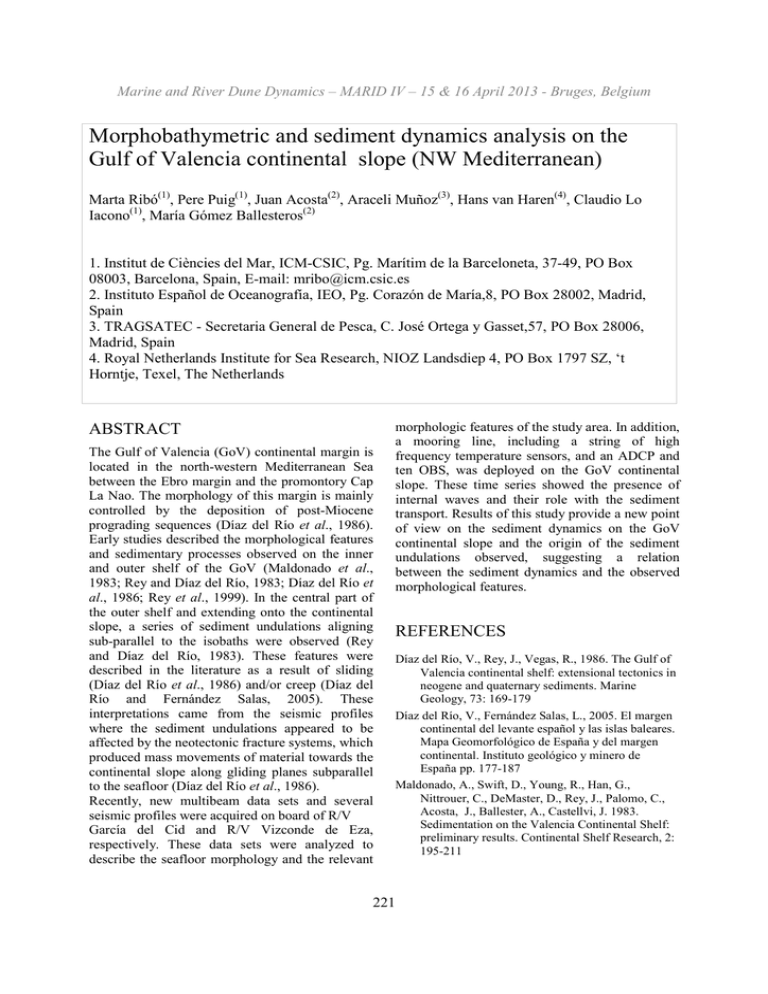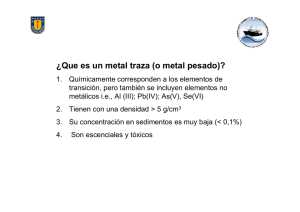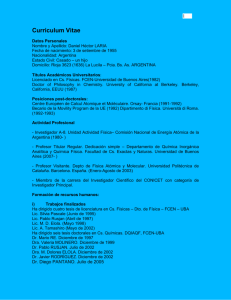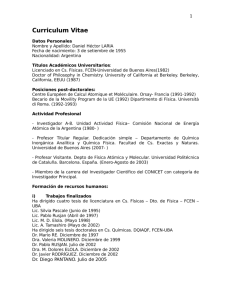Morphobathymetric and sediment dynamics analysis on the
advertisement

Marine and River Dune Dynamics – MARID IV – 15 & 16 April 2013 - Bruges, Belgium Morphobathymetric and sediment dynamics analysis on the Gulf of Valencia continental slope (NW Mediterranean) Marta Ribó(1), Pere Puig(1), Juan Acosta(2), Araceli Muñoz(3), Hans van Haren(4), Claudio Lo Iacono(1), María Gómez Ballesteros(2) 1. Institut de Ciències del Mar, ICM-CSIC, Pg. Marítim de la Barceloneta, 37-49, PO Box 08003, Barcelona, Spain, E-mail: mribo@icm.csic.es 2. Instituto Español de Oceanografía, IEO, Pg. Corazón de María,8, PO Box 28002, Madrid, Spain 3. TRAGSATEC - Secretaria General de Pesca, C. José Ortega y Gasset,57, PO Box 28006, Madrid, Spain 4. Royal Netherlands Institute for Sea Research, NIOZ Landsdiep 4, PO Box 1797 SZ, ‘t Horntje, Texel, The Netherlands ABSTRACT The Gulf of Valencia (GoV) continental margin is located in the north-western Mediterranean Sea between the Ebro margin and the promontory Cap La Nao. The morphology of this margin is mainly controlled by the deposition of post-Miocene prograding sequences (Díaz del Río et al., 1986). Early studies described the morphological features and sedimentary processes observed on the inner and outer shelf of the GoV (Maldonado et al., 1983; Rey and Díaz del Río, 1983; Díaz del Río et al., 1986; Rey et al., 1999). In the central part of the outer shelf and extending onto the continental slope, a series of sediment undulations aligning sub-parallel to the isobaths were observed (Rey and Díaz del Río, 1983). These features were described in the literature as a result of sliding (Díaz del Río et al., 1986) and/or creep (Díaz del Río and Fernández Salas, 2005). These interpretations came from the seismic profiles where the sediment undulations appeared to be affected by the neotectonic fracture systems, which produced mass movements of material towards the continental slope along gliding planes subparallel to the seafloor (Díaz del Río et al., 1986). Recently, new multibeam data sets and several seismic profiles were acquired on board of R/V García del Cid and R/V Vizconde de Eza, respectively. These data sets were analyzed to describe the seafloor morphology and the relevant morphologic features of the study area. In addition, a mooring line, including a string of high frequency temperature sensors, and an ADCP and ten OBS, was deployed on the GoV continental slope. These time series showed the presence of internal waves and their role with the sediment transport. Results of this study provide a new point of view on the sediment dynamics on the GoV continental slope and the origin of the sediment undulations observed, suggesting a relation between the sediment dynamics and the observed morphological features. REFERENCES Díaz del Río, V., Rey, J., Vegas, R., 1986. The Gulf of Valencia continental shelf: extensional tectonics in neogene and quaternary sediments. Marine Geology, 73: 169-179 Díaz del Río, V., Fernández Salas, L., 2005. El margen continental del levante español y las islas baleares. Mapa Geomorfológico de España y del margen continental. Instituto geológico y minero de España pp. 177-187 Maldonado, A., Swift, D., Young, R., Han, G., Nittrouer, C., DeMaster, D., Rey, J., Palomo, C., Acosta, J., Ballester, A., Castellvi, J. 1983. Sedimentation on the Valencia Continental Shelf: preliminary results. Continental Shelf Research, 2: 195-211 221 Marine and River Dune Dynamics – MARID IV – 15 & 16 April 2013 - Bruges, Belgium Rey, J., Díaz del Río, V., 1983. Aspectos geológicos, sobre la estructura poco profunda de la plataforma continental del levante español. Estudio Oceanográfico de la Plataforma Continental E.O.P.C. Cádiz 15-18 Marzo 1983. Gráficas Buper S.A., pp.53-74 Rey, J., Fernández Salas, L., Blázquez, A., 1999. Identificación de las unidades morfosedimentarias cuaternarias en la plataforma interna del litoral del País Valenciano: el rol de los factores morfoestructurales y eustáticos. Geoarquología i Quaternari litoral. Memorial M.P. Fumanal: 403418. 222



